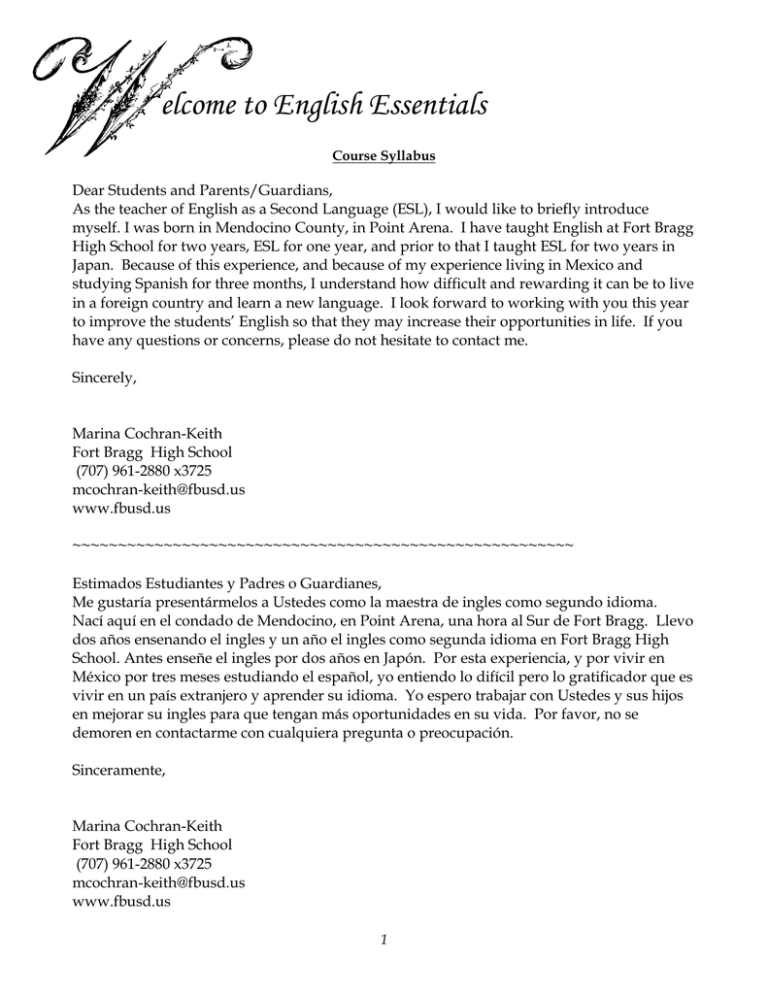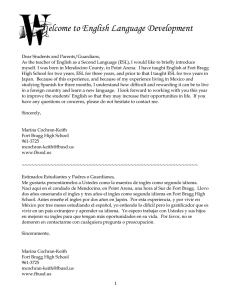elcome to English Essentials
advertisement

elcome to English Essentials Course Syllabus Dear Students and Parents/Guardians, As the teacher of English as a Second Language (ESL), I would like to briefly introduce myself. I was born in Mendocino County, in Point Arena. I have taught English at Fort Bragg High School for two years, ESL for one year, and prior to that I taught ESL for two years in Japan. Because of this experience, and because of my experience living in Mexico and studying Spanish for three months, I understand how difficult and rewarding it can be to live in a foreign country and learn a new language. I look forward to working with you this year to improve the students’ English so that they may increase their opportunities in life. If you have any questions or concerns, please do not hesitate to contact me. Sincerely, Marina Cochran-Keith Fort Bragg High School (707) 961-2880 x3725 mcochran-keith@fbusd.us www.fbusd.us ~~~~~~~~~~~~~~~~~~~~~~~~~~~~~~~~~~~~~~~~~~~~~~~~~~~~~~~ Estimados Estudiantes y Padres o Guardianes, Me gustaría presentármelos a Ustedes como la maestra de ingles como segundo idioma. Nací aquí en el condado de Mendocino, en Point Arena, una hora al Sur de Fort Bragg. Llevo dos años ensenando el ingles y un año el ingles como segunda idioma en Fort Bragg High School. Antes enseñe el ingles por dos años en Japón. Por esta experiencia, y por vivir en México por tres meses estudiando el español, yo entiendo lo difícil pero lo gratificador que es vivir en un país extranjero y aprender su idioma. Yo espero trabajar con Ustedes y sus hijos en mejorar su ingles para que tengan más oportunidades en su vida. Por favor, no se demoren en contactarme con cualquiera pregunta o preocupación. Sinceramente, Marina Cochran-Keith Fort Bragg High School (707) 961-2880 x3725 mcochran-keith@fbusd.us www.fbusd.us 1 Objectives: The goal of this class is to improve reading, writing, listening, and speaking abilities of all students and to give students the skills and necessary background needed to be strong writers and analytical readers so that they can pass the CAHSEE and be successful in college preparatory English courses in future years. Course Description: This class is designed to help students of varying levels of English fluency through active learning strategies and by learning language in context. The emphasis of this course is on improving reading comprehension and writing skills. The core textbook is Hampton-Brown’s Edge Level A. Supplemental resources include the books Q-Reads, Themes for Today, The Oxford Picture Dictionary, The New Grammar in Action, and the Rosetta Stone Software. All content is standards-based (see page 4). Academic Expectations: Students are expected to be active and independent learners: they should use critical thinking, participate in class, complete daily work in class or at home, turn in assignments on time, and know when to study more at home or ask for help. We will focus on these areas: Vocabulary – Words, Roots, Affixes Writing – Journals, Literary Analysis & Response, Stories, Poems, Expository, Conventions Reading – Comprehension, Academic Strategies Speaking – Fluency, Pronunciation, Communication, Oral Presentations Listening – Comprehension Grading Policy: Students will earn credit for each task or assignment completed, but the final grade will be based on the percentages below. A standard grading scale is used. Oral Communication – 10% Class Participation – 15% Homework – 15% Tests/Quizzes – 30% Writing – 30% Late work will receive partial or no credit depending on the circumstances. Please use ASSETs if you need help with your homework! A bilingual teacher is available for help on these days: Mondays: Mr. Swimmer Wednesdays: Ms. Malone Tuesdays: Ms. Cochran-Keith Thursdays: Ms. Cochran-Keith Behavioral Expectations: 1. BE PREPARED TO WORK BY THE TIME THE BELL RINGS 2. BE RESPECTFUL AND POLITE TO OTHERS IN THE CLASSROOM 3. OBEY ALL SCHOOL RULES Students who chose to disrupt the class will receive a warning, then a school-administered consequence, and then a parent will be called. Absence Policy: Students are responsible for obtaining and completing missed work. Students may NOT make up work after the due date if the absence is unexcused. There are several ways to obtain missing work: ask a friend, check the class website, email the teacher, call the teacher BEFORE the work is due, or talk to the teacher after class, during break or lunch, or after school IF the absence is excused. Tardy Policy: Students are tardy if they are not in their assigned seat with their materials when the bell rings. 5 tardies = referral and detention; 10 tardies = Saturday School. Hall Pass Policy: Reasonable requests will be granted, but excessive use will result in the privilege being revoked. 2 Dear Student, These guidelines are here because I care about you and I want you to feel safe and supported in my classroom. My goal is to create every opportunity possible for you to be successful in English Essentials. Come with a positive attitude and a willingness to work and you will do just fine. Please read through this syllabus with your parents or guardians and then sign and return this page only. Thank you! – Ms. Cochran-Keith STUDENT: “I have read and understood the English Essentials syllabus and I will honor the expectations, rules, and procedures.” Student Name (print): ___________________________________________________________ Student Signature: _____________________________________________ Date: ____________ PARENT/GUARDIAN: “My son/daughter has discussed the classroom expectations, rules, and consequences with me. I understand them and will support them.” Parent/Guardian Name (print):______ ______________________________________________ Parent/Guardian Signature: ____________________________________ Date: ____________ TEACHER: “I will be fair and consistent in administering the discipline plan for all students.” Teacher Signature: ____________________________________________ Date: ____________ Estimado Estudiante, Yo tengo éstas reglas porque Ustedes me importan y quiero que se sientan seguros y apoyados en mi salón de clase. Mi meta es crear toda oportunidad posible para que tengan éxito en la clase. Si llegan con una actitud positiva y buena voluntad, harían muy bien. Por favor, lean éste programa de estudios con sus padres o guardianes y entonces firmen y entregan solamente esta pagina. Muchísimas gracias! --Ms. Cochran-Keith Estudiante: "He leído y entiendo el programa de estudios y honraré las expectaciones, las reglas, y los procedimientos." Nombre del Estudiante:________________________________________________________ Firme:______________________________ Fecha:________________________________ Padre o Guardián: "Mi hijo me ha hablado de las expectaciones, las reglas, y los procedimientos. Los entiendo y los apoyaré." Nombre del Padre o Guardián:___________________________________________________ Firme: _______________________________ Fecha:_______________________________ Maestra: "Yo seré parcial, justo, y consistente en administrar el plan de la disciplina para todos los estudiantes." Firme:_____________________________ Fecha:_______________________________ 3 ELD III Standards: Intermediate Level Speaking & Listening – use standard English grammar to be understood when speaking; identify and restate main idea & details of narrative and expository content; identify media messages and give details; respond to messages with questions or restatements; prepare and deliver short oral presentations; prepare and ask basic interview questions and respond to them; and actively participate in social conversations on familiar topics by asking and answering questions. Reading: Word Analysis & Systematic Vocabulary Development —pronounce most English sounds correctly when reading; apply knowledge of morphemes, phonics, and syntax to understand meaning of words and texts; identify cognates and false cognates; apply knowledge of text connectors to make inferences; use knowledge of syntax to understand idioms, analogies, and metaphors; recognize that words sometimes have multiple meanings; identify variations of words and understand how affixes change meaning; use a dictionary to find meanings of unknown words; and self-correct when reading aloud. Reading: Comprehension — read and use simple sentences to orally identify the features of rhetorical devices in expository text; read and identify format of workplace documents; read and use detailed sentences to orally identify main ideas and use them to make predictions about narrative and expository text; present brief reports on multiple expository texts; listen to and critique evidence in political speeches; understand and orally explain multiple-step directions; . Reading: Literary Response & Analysis — read and use detailed sentences to orally explain the literary elements of theme, plot, setting and characters; read and use detailed sentences to orally respond to factual comprehension questions taken from three forms of literature; apply knowledge of language to analyze and derive meaning/comprehension from literary texts; use expanded vocabulary and descriptive words and paraphrasing for oral and written responses to texts; use detailed sentence to orally compare and contrast a similar theme or topic across three genres; use detailed sentences to orally identify at least two ways in which poets use personification, figures of speech, and sounds; and read and use detailed sentences to orally describe the sequence of events in literary texts and characterization. Writing: Strategies & Applications — recognize structured ideas and arguments and their supporting examples in persuasive writing; write responses to selected literature that exhibit understanding of the text, using detailed sentences and transitions; recognize elements of characterization in a piece of writing and apply them when writing; narrate a sequence of events and communicate their significance to the audience; write brief expository compositions and reports that include a thesis and some supporting details and provide information from primary sources and organize and record information on charts/graphs; use complex sentences to write brief fictional biographies and short stories that include a sequence of events and supporting details; write job applications and resumes that are clear and provide all needed information; and investigate and research a topic in a content area and develop a brief essay or report that includes source citations. Writing: Conventions — Revise writing for appropriate word choice and organization, with variation in grammatical forms and spelling; edit and correct basic grammatical structures and usage of the conventions of writing. 4
